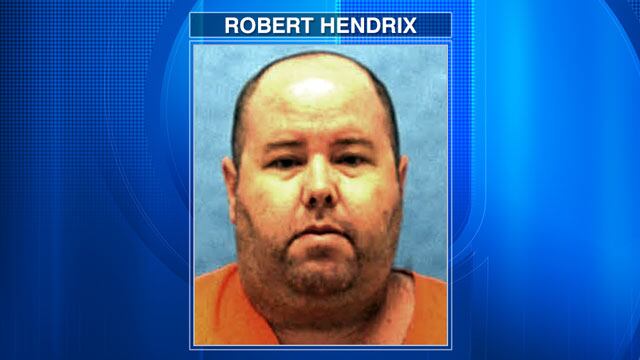STARKE, Fla. — Robert Hendrix didn't want to go back to prison, where he spent time as a teenager. So after his cousin spilled to authorities about an armed burglary they had committed, Hendrix vowed to make sure Elmer Scott never testified against him, even if it meant killing Scott. That's what prosecutors say.
Hendrix, 47, is scheduled to be executed by lethal injection Wednesday at the Florida State Prison in Starke for the 1990 murders of Elmer and Michelle Scott at their Lake County home. But he's seeking a last-minute court stay as his lawyer argues that two witnesses for the prosecution were unreliable and that no forensic evidence links him to the crimes.
In August 1990, the night before his trial in the armed burglary case was to begin, Hendrix shot Scott in the face in his trailer home, hit him in the head with the gun and stabbed him in the neck, prosecutors have said. He then used a knife to cut the throat of Scott's wife, Michelle, who fought back before Hendrix shot her three times, they added.
Scott had already made a plea deal with prosecutors in the armed burglary case in which he and Hendrix broke into a house but only Scott was caught. His cooperation led investigators to arrest Hendrix. In the weeks leading up to his trial, prosecutors say, Hendrix told friends he would kill Scott rather than return to prison.
But Scott and his attorney, Harry Brody, said the case is plagued by problems.
"There isn't any real forensic evidence placing him at the scene," Brody said. "He maintains the state hasn't proven anything."
Prosecutors say that on the night of the murders, Hendrix's live-in girlfriend, Denise Turbyville, drove him from Orange County, where they lived, to the Scotts' trailer in neighboring Lake County and dropped him off. Michelle Scott welcomed Hendrix into the trailer, and told him Elmer Scott was in the bathroom shaving and would be out shortly. When Elmer Scott came out, Hendrix asked to use the bathroom. When he left the bathroom, Hendrix fired shots at Elmer Scott and then grabbed a knife and attacked Michelle Scott, according to prosecutors.
Brody said the two main witnesses against Hendrix, Turbyville and Roger LaForce, who claimed Hendrix told him details about the murders while they shared a cell in the Lake County Jail, are unreliable. According to Brody, both had a self-interest in testifying for prosecutors.
Turbyville pleaded guilty to two counts of second-degree murder and was sentenced to 75 years in prison instead of facing the possibility of the death penalty for a first-degree murder charge. LaForce was a confidential informant for a narcotics task force and stood to gain a lighter sentence for his assistance, Hendrix's attorneys say.
"These two main witnesses were terribly compromised," Brody said.
Brody also said the presiding judge had a conflict of interest, Hendrix's trial lawyer was ineffective at presenting mitigating circumstances during sentencing and that Hendrix was shackled during his trial, leading jurors to a biased impression that he was dangerous.
The conflict of interest claim arises from Hendrix's assertion that an attorney of Hendrix's girlfriend had consulted with the presiding judge about the case before the judge joined the bench. The girlfriend, Turbyville, was a star witness for the prosecution. Appellate courts have dismissed the allegation. Hendrix's attorneys also claimed the judge had presided over a criminal case against LaForce.
During sentencing, Hendrix's attorneys failed to call witnesses who could have testified that Hendrix was regularly beaten by his father and had a serious drug addiction, factors that could explain his unbalanced mental state, according to court papers filed by Hendrix.
Through the Attorney General's Office, family members of the victims didn't respond to a request for an interview.
Prosecutors contend Hendrix's claims of error during the trial are without merit.
"Hendrix fashions a cumulative error claim but fails to identify where any court has ever found error in any of his claims that would entitle him to relief," Assistant Attorney General Mitchell Bishop said in a recent court filing.
If the execution is carried out, Hendrix would be the fourth person executed in Florida this year and the 16th since Gov. Rick Scott took office in 2011. A petition is pending before the U.S. Supreme Court, and Hendrix has filed a request for a stay of execution with the Florida Supreme Court.
WFTV





